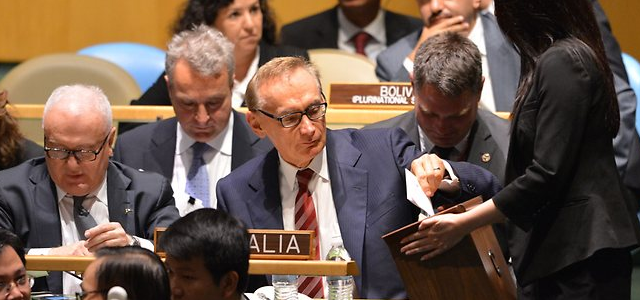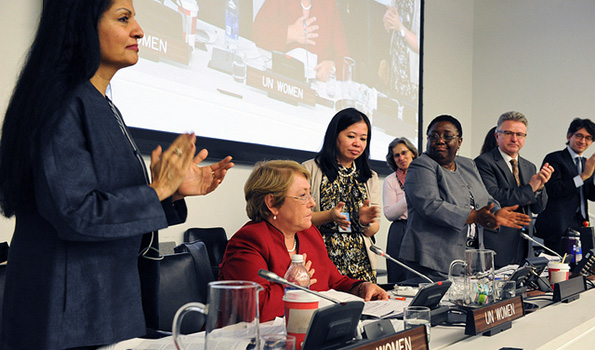No real surprise, but the selection of the new Assistant Secretary General for Human Rights has turned into an out-and-out race. Colum Lynch at Turtle Bay is suggesting nine potential candidates under consideration as of today, and UNElections.org is aware of at least two others.
The position was created only last December and will replace the head of the New York office for the Geneva-based Office of High Commissioner for Human Rights. The trend toward greater scrutiny and demand for transparency in global leadership selection, the horse-trading suspected in the post’s creation, and its guaranteed politicized nature has prompted a great deal of attention to the appointment and the high-profile candidates being considered.
Lynch reports the following candidates’ names are being bantered about:
- Irene Khan, former secretary general of Amnesty International, from Bangladesh
- Heraldo Muñoz, Chile’s UN ambassador;
- David Scheffer, a former U.S. ambassador at large for war crimes;
- Joanna Weschler, former UN rep for Human Rights Watch and Solidarity activist from Poland;
- Jamal Benomar, chief of staff to the current UN General Assembly president and a former political prisoner;
- Carlos Portales, Chile’s UN ambassador in Geneva;
- Marieclaire Acosta, who served as a former Mexican ambassador for human rights and democracy;
- Reed Brody of Human Rights Watch; and
- Michael O’Flaherty, an Irish legal scholar who serves on the UN Human Rights Committee.
In addition, UNElections.org is reporting that two other individuals have applied:
- Piet de Klerk , Deputy Permanent Representative of the Netherlands to the UN and formerly the Netherlands’ Ambassador-at-large for Human Rights; and
- Paulo Sérgio Pinheiro, currently a Commissioner of the Organization of American States’ Inter-American Commission on Human Rights
Human rights have always been politicized in international relations and, as Lynch notes, the Office of High Commissioner has likewise always been a controversial post since its creation in 1993. The successive office-holders have been criticized by either human rights groups, demanding stronger responses to violations, or by governments, charging bias or political motives. The ASG will be no different, and perhaps, worse. As a colleague wryfully noted, “Great, you’d get to be a global nag that everyone complains about. Tough gig. ”
A selection committee will take a first whack at the potential candidates, narrowing down the list to three names for the SG to consider.
The selection panel will be led by [Navi] Pillay, the South African High Commissioner for Human Rights, her South Korean deputy Kyung-wha Kang, Jessica Neuwirth, an American who currently heads the high commissioner’s liaison office in New York, and Patricia O’Brien of Ireland, the U.N.’s top lawyer. The panel is set to begin interviewing candidates on March 15 and they will present the secretary-general with a short list of three candidates. Ban will make the final decision. (Lynch)
The declared criteria which the selection committee will use, according to UNElections.org, are fairly mundane – at least 20 years of senior leadership experience in human rights or a related field, negotiation and diplomatic skills, and strong leadership and management abilities.
The ASG will have a significant influence on human rights issues before the world organization, but will likely be more visible (and thus more of a target?) given the officeholder’s base being in New York at the headquarters. This visibility could make Ban’s choice more difficult as he weighs how his selection will play out over the remaining two years of his first (and possibly only) term. Unlike Pillay, whose nomination had to be approved by the GA, Ban will make the final choice on the ASG.
Whereas Annan might have seized on this home-court advantage and the new-ness of the post to appoint a strong human rights advocate, Ban – the ever cautious and diplomatic Secretary General – almost certainly will not. Rather, he is likely to select the candidate for the New York office least likely to offend the powers-that-be. As Lynch writes in a previous column,
…the pendulum has swung back in favor of political appointees under Ban Ki-moon, who accepted the favored candidates of each of the U.N.’s powerful permanent five members in his first year in office, according to senior U.N. officials. Ban has used appointments to strike a careful geographical balance among the interests of influential member states.
The only apparent means of avoiding a mediocre if not poor choice may rest with High Commissioner Pillay herself exerting a strong say in the final short list presented by the selection committee to the Secretary General. As a “fiercely uncompromising and independent …voice for the victim everywhere,” Pillay may be able to provide Ban the opportunity he would otherwise try to avoid.



“At least 20 years of senior leadership experience” tilts the balance toward an older, “establishment” candidate. Is it actually necessary? The energy and perspectives of younger, qualified people will be lost with this oddly stringent requirement.
Ban has apparently already agreed to Brazilian Phinheiro for this post. The excuse will apparently be that there are already too many women at the top in the High Commissioner's Office. Sadly, this recruitment will be added to the long list of posts where politics trumps competency.